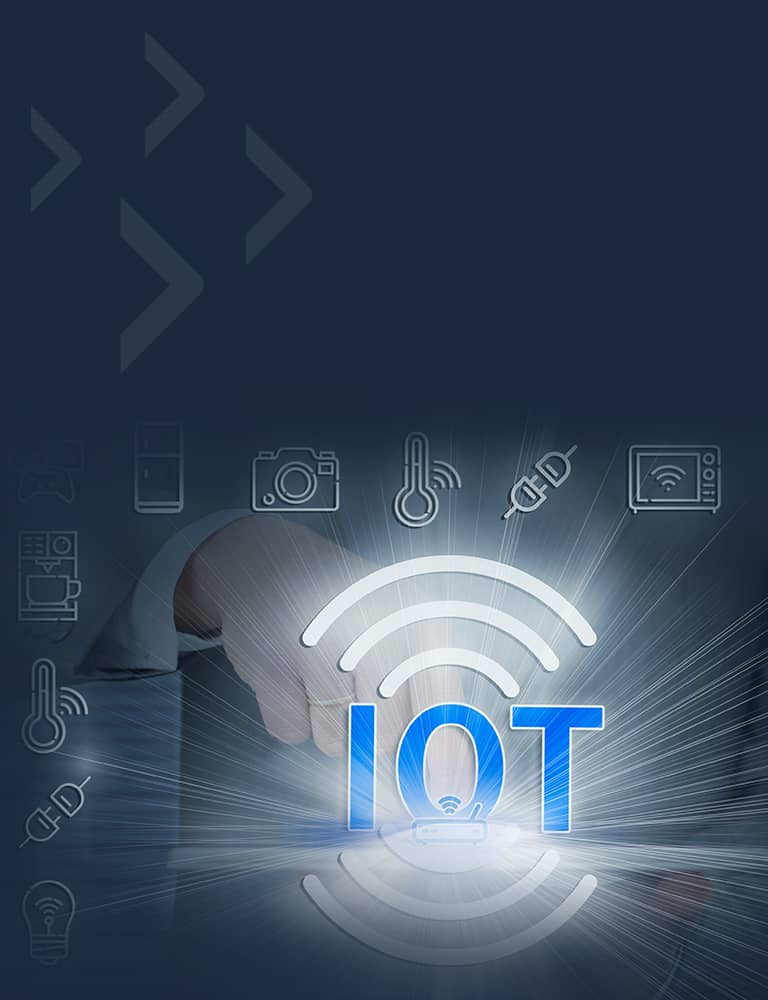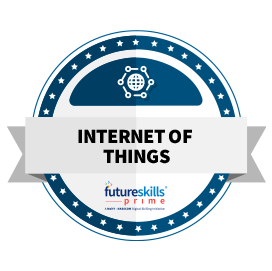Course Provider

What will you learn in IoT Foundation Course SFI course?
- This Course has been divided into five modules. While the first is an introductory module, the remaining four each correspond to the different layers of the IoT tech stack.
- This course enables you to explore the fundamentals of IoT, to provide you with a base from where you can upskill yourselves for specific IoT job roles.
- Tools covered - Cisco AnyConnect, Arduino, Cisco AMP For Endpoints, Cisco Umbrella, Zingbox & Raspberry Pi.
IoT Foundation Course SFI201
-
 Skill Type
Emerging Tech
Skill Type
Emerging Tech -
 Domain
IoT
Domain
IoT -
 Course Category
Foundation course
Course Category
Foundation course -
 Certificate Earned Joint Co-Branded Participation Certificate
Certificate Earned Joint Co-Branded Participation Certificate -
 Course Covered under GoI Incentive
Yes
Course Covered under GoI Incentive
Yes -
-
 Course Price
INR 10,000+ 18% GST
Course Price
INR 10,000+ 18% GST -
 Course Duration
45 Hours
Course Duration
45 Hours
-
Why should you take IoT Foundation Course SFI course?
After completing this course, you will:
- Explain the role of IoT in transforming businesses and customer use cases.
- Discuss key application areas of IoT such as remote monitoring, asset tracking, production optimization, predictive maintenance and the development of new products and services.
- Explain the various layers of the IoT stack and explain what constitutes an IoT architecture.
- Discuss the applications of various components used in IoT solutions (such as sensors, actuators, microcontrollers, circuit boards, embedded chips, gateways, cloud platforms, etc).
- Understand the applications of embedded systems and appreciate the importance of embedded devices as data acquisition devices.
- Discuss various IoT communications protocols and determine best fit for different IoT applications.
- Discuss the different models of cloud computing (i.e., IaaS, PaaS, SaaS).
- Discuss the possible uses of analytics solutions to leverage data generated by IoT.
- Evaluate the basic principles of security design and architecture and the commonly used methods to mitigate security risks to IoT solutions.
Who should take IoT Foundation Course SFI course?
- University students enrolled in streams such as Engineering, Computer Science, Statistics, Sciences or Mathematics.
- Employed professionals who wish to explore their career options and interests with regards to IoT.
- Enthusiasts curious about understanding the hype behind IoT.
Curriculum
Total 5 Module, At the end of all the lessons knowledge check quiz is given, find below topics covered under each module with Theory & practical details.
Module 1: Introduction to IoT (Theory)
- Introduction to IoT
- IoT Trends and Applications
- IoT Stack, Applications and Data Management
Module 2: IoT Devices (Theory + Practical Activity)
- Embedded system in Real and Digital life
- Components of IoT Devices
- Fundamentals of Sensors and Interfacing in Microcontroller
- Fundamentals of Actuators and its interfacing
- Fundamentals Microcontrollers
- Programming the Microcontroller
- IoT Based Smart Energy Management System
- Legal Compliance Management
Practical Activity: Write simple programs for executing specific tasks on the microcontroller or simulator - My first IoT program
Module 3: IoT Networking and Communications (Theory)
- IoT Networking and Communications
- Fundamentals of IoT networks
- Deployment Model
- Wired/wireless connectivity protocol
- Characteristics of connectivity protocol
Module 4: IoT Data Storage and Analysis (Theory + Practical Activity)
- Cloud Computing in IoT
- IoT Data Management
- IoT Data Analytics
- Python in IoT
- IoT Cloud
Practical Activity: Perform a hands-on activity (such as data storage and management, data analysis, log analysis, etc) with a simulated IoT platform using cloud services. Analyse data using tools such Excel, R or Python :- Data - Log management using cloud services
Module 5: IoT Security and Privacy (Theory + Practical Activity)
- IoT Security
- IoT Security Framework
- IoT Privacy and Risks
- IoT Components and Principles
- IoT Overview, Penetration Testing, and OWASP Top 10
Practical Activity: Discuss security framework guidelines that ensure the security and privacy of all data flowing within the solution. Ensure that the security framework covers all aspects of the IoT stack including physical security of the device, encryption of communications, and safeguards to protect access to data :- IoT security framework guidelines
Tools you will learn in IoT Foundation Course SFI course
- Cisco AnyConnect
- Arduino
- Cisco AMP For Endpoints
- Cisco Umbrella
- Zingbox & Raspberry Pi




